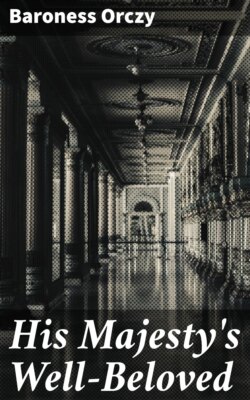Читать книгу His Majesty's Well-Beloved - Baroness Orczy - Страница 20
На сайте Литреса книга снята с продажи.
4
ОглавлениеTable of Contents
My Lord Stour came to call upon Mr. Theophilus Baggs at three o’clock of the afternoon. Kathleen, the maid of all work, opened the door to him, and Mistress Euphrosine received him in the Parlour, where I was also sitting at my desk, engaged in copying out a lengthy Indenture.
“Master Baggs awaits me, I think,” my Lord said as he entered the room.
Mistress Euphrosine made a deep curtsey, for she was ever fond of the Aristocracy.
“Will you deign to enter, my Lord?” she said. “My husband will wait upon your pleasure.”
“Tell him to be quick, then,” said my Lord; “for I have not a great deal of time to spare.”
He seated himself beside the table and drew off his gloves. He had taken absolutely no notice of my respectful salutation.
Mistress Euphrosine sailed out of the room and a moment or two later Mr. Baggs came in, carrying a sheaf of papers and looking very fussy and obsequious.
My Lord did not rise to greet him, only turned his head in his direction and said curtly:
“You are Mr. Theophilus Baggs, Attorney-at-law?”
“At your Lordship’s service,” replied my employer.
“Brother-in-law of Tom Betterton, the Actor, so I am told,” my Lord went on with quiet condescension.
This innocent remark, however, appeared to upset Mr. Baggs. He stammered and grew as red as a turkey-cock, not realizing that his connection with the great Actor was truly an honour upon his Name. He hemmed and hawed and looked unutterably foolish, as he mumbled confusedly:
“Er ... that is ... only occasionally, my Lord ... very occasionally, I may say ... that is ... I...”
“Pray calm yourself,” broke in my Lord haughtily. “I admire the fellow’s acting ... the Man himself does not exist for me.”
“You are most gracious, my Lord,” murmured Mr. Baggs promptly, whilst I could have struck him for his obsequiousness and his Lordship for his arrogance.
It seems that the matter which had brought Lord Stour to Mr. Baggs’ office was one of monies connected with the winding-up of the affairs of the late Earl, uncle of the present Peer. I was busy with my work during the time that these affairs were being discussed and did not pay much heed to the conversation. Only two fragments thereof struck mine ear. I remember, chiefly because they were so characteristic of the two men—the Aristocrat and the Plebeian—and of the times in which we live.
At one time Mr. Baggs ventured to enquire after the health of the Honourable Mrs. Stourcliffe, his Lordship’s mother; and you should have heard the tone of frigid pride wherewith my Lord seemed to repel any such presumptuous enquiries.
The other fragment which I overheard was towards the end of the interview, when Mr. Theophilus Baggs, having counted over the Money before his Lordship, placed a Paper before him and bade me bring him a pen.
“What’s this?” queried my Lord, astonished.
“Oh!” Mr. Baggs stammered, with his habitual humility of demeanour, “a mere formality, my Lord ... er ... h’m ... only a ... er ... receipt.”
“A receipt?” my Lord asked, with an elevation of his aristocratic brows. “What for?”
“Er ... er...” Mr. Baggs stammered. “For the monies, my Lord. That is ... er ... if you will deign to count it over yourself ... and see that it is correct.”
At this, my Lord rose from his seat, waved me aside, took and pocketed the money. Then he said coolly to Mr. Baggs:
“No, Sir; I do not care to count. My Uncle knew You to be honest, or he would not have placed his affairs in your hands. That is sufficient for me. I, on the other hand, have received the money.... That is sufficient for You.”
“But——!” ejaculated Mr. Baggs, driven out of his timidity by such summary procedure.
“Egad, Sir!” broke in my Lord, more haughtily than before. “Are you perchance supposing that I might claim money which I have already had?”
“No ... no!” protested Mr. Baggs hastily. “I assure you, my Lord ... er ... that it is ... h’m ... a mere formality ... and...”
“My word,” retorted my Lord coolly, “is sufficient formality.”
Whereupon he turned to the door, taking no more notice of me than if I were the doormat. He nodded to Mr. Baggs, who was of a truth too deeply shaken to speak, and with a curt “I wish you good-day, Mr. Notary!” strode out of the room.
I doubt not, Mistress, that You and many others of gentle Manners if not of gentle Birth, would think that in recounting this brief interview between my employer and the young Earl of Stour, I have been guilty of exaggeration in depicting my Lord’s arrogance. Yet, on my word, it all occurred just as I have told it. No doubt that Mr. Baggs’ obsequiousness must have been irritating, and that it literally called forth the haughty Retort which otherwise might have remained unspoken. I myself, humble and insignificant as I am, have oft felt an almost uncontrollable impulse to kick my worthy Employer into some measure of manliness.
For let me assure You that, though subsequently I became more closely acquainted with my Lord Stour, I never heard him use such haughty language to any of his Dependents, nor do I think that so gentle a Lady as Lady Barbara Wychwoode would have bestowed her fondness and regard upon him had his Nature been as supercilious and as insolent as his Words.
